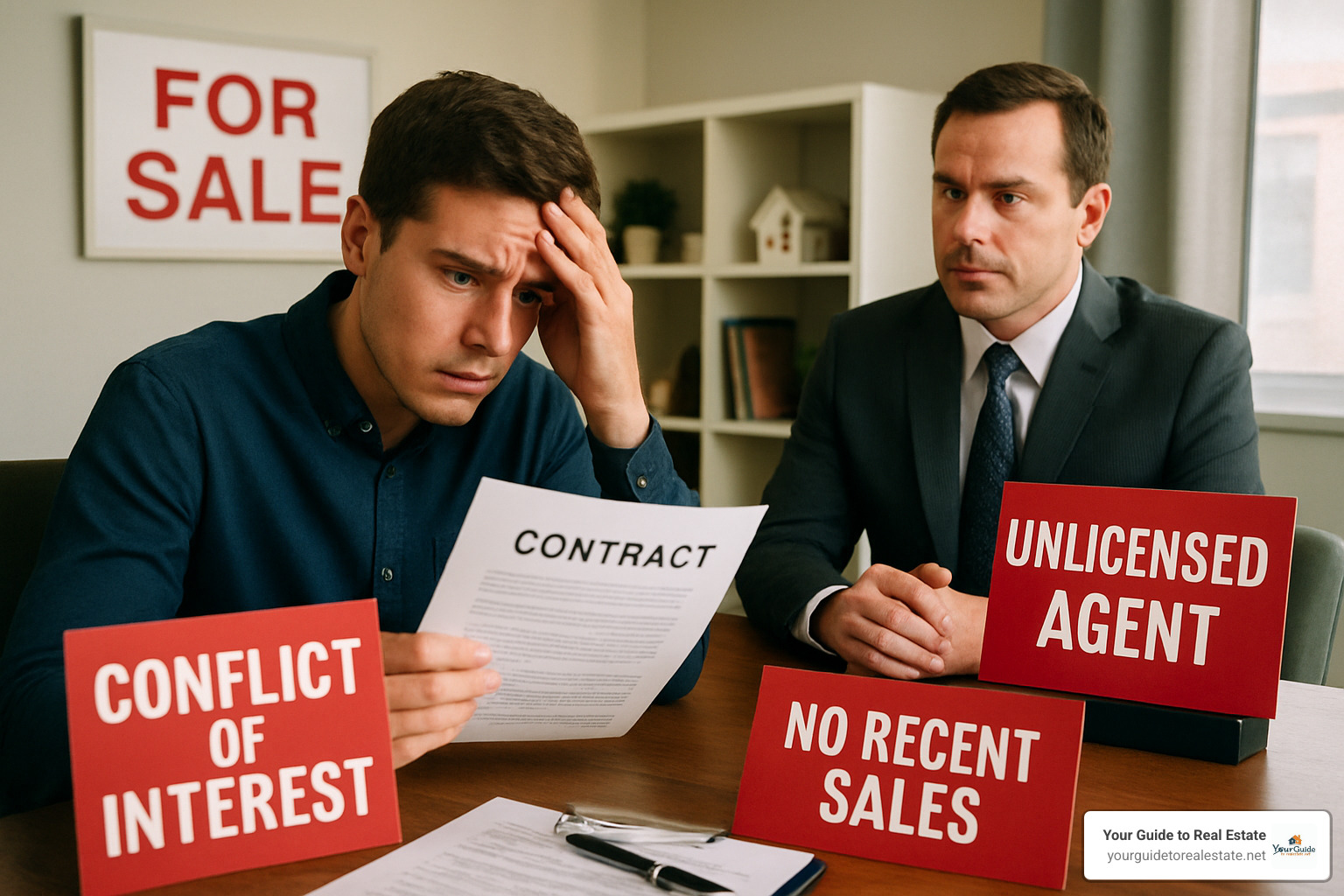Why Choosing the Right Real Estate Agent Matters
How to select the best real estate agent is one of the most critical decisions you’ll make in your home buying or selling journey. Considering that this is likely one of the largest financial transactions of your life, having the right professional by your side can make all the difference.
If you’re looking for a quick answer, here’s how to select the best real estate agent:
- Get referrals from friends, family, and trusted sources
- Research credentials – verify licensing and check for complaints
- Interview at least 3 agents with the same prepared questions
- Evaluate local expertise in your specific neighborhood
- Check communication style and responsiveness
- Review track record – sale-to-list price ratio and days on market
- Trust your gut – chemistry and comfort matter
According to industry data, 80% of sellers pick the first agent they meet with, potentially missing out on better options. Meanwhile, the top 5% of real estate agents sell homes for as much as 10% more than the average agent.
Choosing an agent isn’t just about finding someone with a license – it’s about finding a professional who understands your needs, knows your local market inside and out, and has the skills to negotiate effectively on your behalf.
“Selling a home is one of the most important financial transactions of your life — you need the best representation,” notes one industry expert. This is equally true for buyers navigating today’s competitive market.
Whether you’re buying your first home or selling your fifth, the agent you choose will shape your entire experience – from how quickly you find or sell a property to how much money you ultimately make or save in the process.

How to Select the Best Real Estate Agent: 7-Step Framework
Finding the perfect partner for your real estate journey doesn’t have to feel like searching for a needle in a haystack. Our practical 7-step framework makes how to select the best real estate agent straightforward and stress-free.
Did you know that 89% of home sellers choose to work with a real estate agent? And with nearly half of today’s buyers making offers based solely on virtual tours, having a tech-savvy professional in your corner has never been more important.
While 65% of sellers find their agent through personal referrals or previous relationships, that’s just the beginning of a thorough selection process. Let’s break down how to find your perfect match:
Step 1 – Clarify Your Goals & Timeline
Before you start meeting agents, take a moment to get crystal clear about what you really want:
If you’re selling, are you looking for a quick sale or top dollar? Do you have a firm moving deadline? What’s the minimum price you’ll accept? Are you open to making pre-listing improvements?
For buyers, knowing your budget is essential—and getting pre-approved for a mortgage shows agents you’re serious. Think about your must-have neighborhoods, non-negotiable home features, and your ideal moving timeline.
This clarity not only helps you find the right agent but also signals to professionals that you’re prepared and ready to move when opportunity knocks.
Step 2 – Build a Shortlist
Now that you know what you’re looking for, it’s time to gather some promising candidates:
Start with those trusted referrals from friends and family who’ve recently bought or sold. Visit open houses to see agents in action—you’ll learn a lot about their style and approach. Research online using tools like Zillow’s agent finder tool, which lets you compare local agents based on their track record and client feedback.
Don’t overlook the value of simply driving around your target neighborhoods. Those “For Sale” and “Sold” signs reveal which agents are actively working your area. Mortgage officers and home inspectors can also recommend agents they respect from their professional networks.
Aim for 5-7 potential agents to research before narrowing down to your interview shortlist.
Step 3 – Verify Licensing & Credentials
Time to make sure your potential agents have the right qualifications:
Check their licensing status through your state’s real estate commission website or the Arello database, which compiles licensing information nationwide. While you’re at it, look for any disciplinary actions or complaints.
Determine if they’re a Realtor® (a member of the National Association of Realtors who follows a strict code of ethics) or simply a licensed agent. There’s a meaningful difference in the professional standards they’re held to.
Specialized certifications can also tell you a lot about an agent’s expertise. A CRS (Certified Residential Specialist) has advanced training in home sales. An SRES (Seniors Real Estate Specialist) understands the unique needs of older adults. MRP (Military Relocation Professional) indicates someone who specializes in helping service members relocate.
These credentials show an agent has invested in education beyond the basics—a good sign they take their profession seriously.
Step 4 – Evaluate Local Track Record

When it comes to how to select the best real estate agent, local expertise isn’t just nice to have—it’s essential. An agent might have impressive overall numbers but limited experience in your specific neighborhood or property type.
Look at their recent sales history in your area. Are they regularly working with properties in your price range? Check their performance metrics like average days on market (lower is generally better) and sale-to-list price ratio (higher percentages suggest stronger negotiation skills).
A truly knowledgeable local agent should be able to talk confidently about school districts, development plans, zoning changes, and other neighborhood factors that affect property values. As the saying goes, real estate is all about “location, location, location”—and that applies to agent selection too!
Step 5 – Assess Marketing Firepower
For sellers especially, your agent’s marketing capabilities can dramatically impact your bottom line:
Visit their website and social media accounts to evaluate their digital presence. Look at their current listings—are the photos professional? Do they offer virtual tours? In today’s market, stunning photography is a minimum requirement, and 3D tours through tools like SHOWCASE have become increasingly important.
Ask how they leverage the Multiple Listing Service (MLS) to maximize exposure for their listings. Inquire about their use of staging, drone footage, floor plans, and targeted marketing strategies.
The best agents create custom marketing plans for each property rather than using cookie-cutter approaches. They understand that different homes attract different buyers and adjust their strategies accordingly.
Step 6 – Check Communication Style & Availability
Communication problems are among the most common complaints about real estate agents. Here’s how to avoid them:
Test their responsiveness right from the start—how quickly do they reply to your initial inquiry? If they take more than a few hours now, when they’re trying to win your business, imagine how they’ll perform during critical negotiations.
Have an honest conversation about communication preferences. Do they prefer calls, texts, or emails? How often will they provide updates? Are they full-time or part-time? Do they have any vacations planned during your buying or selling timeframe?
If you’re considering a team, clarify who you’ll be working with directly. Will it be the lead agent you’re interviewing, or will you be handed off to team members? Neither approach is inherently better, but you should know what to expect and who’s got your back when urgent situations arise.
The right agent adapts to your preferred communication style while maintaining clear, consistent contact throughout your journey together.
Step 7 – Interview at Least Three Finalists

Here’s a surprising statistic: 59% of sellers contact only one agent before making a decision. Don’t make that mistake! Meeting with at least three candidates gives you valuable perspective on different approaches and personalities.
Prepare a standard set of questions to ask each candidate so you can make fair comparisons. Meet in person if possible—there’s no substitute for face-to-face interaction when assessing personality fit and communication style.
Ask sellers’ agents for a listing presentation or buyers’ agents for a buyer consultation to see how they would approach your specific situation. Discuss commission and contracts upfront to avoid surprises later.
Finally, trust your gut feeling about who you feel most comfortable with. This relationship may last several months and involve significant financial and emotional decisions. The right chemistry matters almost as much as credentials and track record.
By following these seven steps, you’ll be well on your way to finding an agent who not only knows the market inside and out but also understands your unique needs and communication style. The perfect partnership is out there—you just need a systematic approach to find it!
Vetting & Interviewing Agents Like a Pro
The interview process is your opportunity to thoroughly assess each agent’s capabilities and compatibility with your needs. Approach it like you’re hiring for an important position – because you are.
Must-Ask Questions When Interviewing
When you’re figuring out how to select the best real estate agent, asking the right questions is essential. Here are the must-ask questions for your interviews:
-
“How long have you been working in real estate, and specifically in this area?”
Look for at least 2-5 years of experience, with substantial time spent in your target neighborhood. -
“Do you primarily work with buyers or sellers, and what percentage of each?”
Ideally, you want someone who specializes in your side of the transaction but has experience with both. -
“How many clients do you represent at one time?”
Too many (more than 15-20 active clients) might mean limited attention; too few might indicate inexperience or part-time status. -
“What’s your average list-to-sale price ratio, and how many days do your listings typically stay on market?”
For sellers, aim for agents with ratios close to or above 100% and days on market below the local average. -
“How will you market my home?” (for sellers) or “How will you help me find the right home?” (for buyers)
Look for specific, custom strategies rather than generic answers. -
“What’s your negotiation approach, and can you share examples of challenging negotiations you’ve handled?”
The answer should demonstrate both strategy and adaptability. -
“What makes you different from other agents I’m considering?”
This open-ended question often reveals what the agent values most about their service. -
“Can you provide references from recent clients with situations similar to mine?”
Always follow up with these references – they can provide invaluable insights. -
“What do you think will be the biggest challenge in my transaction, and how would you handle it?”
This tests their analytical skills and problem-solving approach. -
“What are your commission rates, and what exactly do they cover?”
Understand what services are included and what might cost extra.
Tools & Data to Cross-Check Answers
Don’t just take agents’ words at face value. Use these resources to verify their claims:
-
Online profiles and reviews – Check platforms like Zillow, Realtor.com, and Google for client feedback patterns.
-
Social media presence – Review their professional social media accounts for activity level and content quality.
-
MLS data – Ask them to show you comparable sales data that supports their pricing recommendations.
-
State licensing boards – Verify their standing and check for any disciplinary actions.

Making Sense of the Numbers
When evaluating agent performance metrics, here’s what to look for:
-
List-to-sale price ratio – Top agents consistently achieve 95% or higher of asking price, with the best reaching 100% or more in competitive markets.
-
Days on Market (DOM) – In 2024, homes sold in an average of 26 days nationwide, but this varies by market. Your agent should beat local averages.
-
Annual transaction volume – Look for agents closing at least one transaction per week (roughly 50+ per year) to ensure they’re actively engaged in the market.
-
Price range experience – Verify they regularly handle properties in your price bracket. Luxury homes and starter homes require different approaches.
The top 5% of agents sell homes for as much as 10% more than the average agent – a significant difference on a major financial transaction.
Red Flags, Mistakes & Conflict-of-Interest Traps

Let’s face it – not all real estate professionals are created equal. Even savvy homebuyers and sellers can miss crucial warning signs during the selection process. I’ve seen it happen time and again: a charming personality masks professional shortcomings, and clients only find the mismatch when they’re deep into a transaction.
Dual Agency & Representation Risks
When how to select the best real estate agent is your priority, understanding representation should be at the top of your checklist. Dual agency – where one agent represents both the buyer and seller in the same transaction – creates an inherent conflict of interest that’s worth serious consideration.
Think of it this way: would you hire the same attorney as the person you’re negotiating against? Probably not. Yet many homebuyers and sellers unknowingly accept this arrangement in real estate transactions.
If you find an agent has a high dual-agency rate (more than 10% of their transactions), this might indicate they prioritize double commissions over client interests. After all, it’s nearly impossible to fully advocate for opposing sides simultaneously.
When discussing representation with potential agents, ask directly: “Will you be representing only my interests in this transaction?” Their answer – and how comfortable they seem providing it – can be revealing.
The types of representation matter tremendously:
Single agency means the agent represents only you and has a fiduciary duty to protect your interests.
Dual agency means the agent represents both parties, creating an inherent conflict that limits how much they can advocate for either side.
Transaction broker arrangements mean the agent facilitates the transaction without fully representing either party – they’re essentially a neutral middleman.
Always get written disclosure of the representation relationship before signing any agreements. You deserve an agent who is 100% committed to your best interests, not trying to serve two masters.
Other Deal-Breakers to Watch For
Beyond dual agency concerns, several other warning signs should make you pause before hiring an agent.
Be wary of agents suggesting an inflated listing price without supporting market data. This “buying the listing” tactic might feel flattering initially, but it typically leads to extended time on market, eventual price cuts, and ultimately a lower final sale price. A good agent will give you an honest, data-backed price opinion – even when it’s not what you hoped to hear.
Part-time status without adequate backup support is another concern. Real estate transactions don’t conveniently happen only on evenings and weekends. When a critical negotiation point arises on a Tuesday morning, you need an agent who’s available – or at least has a capable team member who can step in.
In today’s digital-first market, poor or mediocre marketing skills are simply unacceptable. Professional photography, virtual tours, and a strong online presence aren’t luxury extras – they’re baseline requirements. Ask to see examples of their current listings to assess their marketing quality.
Pay attention to any signs of pushiness or an obvious agenda during your initial meetings. Your agent should guide, not pressure you. They should listen more than they talk, especially during your first conversation.
Be cautious of agents who provide vague answers about their results or seem reluctant to provide references. Top performers are proud of their track record and happy to connect you with satisfied clients.
A weak negotiation history is particularly problematic since real estate is fundamentally a negotiation business. Ask for specific examples of challenging negotiations they’ve handled successfully.
Lack of local market knowledge is a major red flag. General real estate expertise isn’t enough without specific insights about your target neighborhoods. Test this by asking neighborhood-specific questions about recent sales, school performance, or upcoming developments.
Pay attention to responsiveness during the interview process. If they’re slow to return calls or emails now, imagine how they’ll perform during critical transaction phases when time is of the essence.
Finally, be wary of agents who seem overly eager to please without providing honest feedback. Sometimes you need an agent who will tell you uncomfortable truths – like that your home needs significant updates before listing or that your offer is likely too low to be competitive.
The best agent-client relationships are built on trust and transparency. If something feels off during your initial meetings, trust your instincts. The stakes are simply too high to ignore warning signs when selecting the best real estate agent for your needs.
Commissions, Contracts & Protecting Your Wallet
Let’s talk money – because when it comes to real estate, understanding the financial side of working with an agent can save you thousands. Think of this section as your financial safety net when how to select the best real estate agent is on your mind.
Reading the Fine Print
That contract your agent slides across the table isn’t just formality – it’s a legally binding agreement that deserves your full attention. Before you reach for that pen:
Make sure you understand exactly what type of representation you’re getting. Is this person your dedicated advocate (buyer’s or seller’s agent) or simply facilitating the transaction (transaction broker)? The difference matters tremendously for whose interests come first.
Contract duration is something many people overlook until they’re stuck. Standard listing agreements typically lock you in for 3-6 months, while buyer agency agreements usually span 30-90 days. Consider starting with a shorter term – around 60-90 days – with extension options if things are going well.
Your escape hatch matters too. Look for a termination clause that lets you walk away if the service falls short of expectations, ideally without penalty. A good agent who’s confident in their abilities shouldn’t fear this clause.
The contract should spell out exactly what services come with the deal and what might cost extra. Vague language here often leads to misunderstandings and unexpected charges down the road.
When it comes to commissions, sellers typically pay 5-6% of the sale price, which gets split between the listing agent and the buyer’s agent. However, this traditional model is evolving following recent industry settlements. Buyers should note that while the seller traditionally pays the commission, this cost is typically factored into the home’s price.
Watch out for the “protection period” clause – this prevents you from waiting until your contract expires to sell to someone your agent introduced. Make sure this period is reasonable (30-60 days), not excessively long.
For sellers, marketing commitments should be detailed in writing. What exactly will your agent do to promote your property? Don’t accept vague promises.
The real estate industry is currently experiencing significant changes in how commissions work, following a major settlement with the National Association of Realtors. Buyers may now have more flexibility to negotiate agent compensation directly rather than having it built into the home’s purchase price.
Negotiation Tips That Actually Work
Despite what many believe, real estate commissions aren’t set in stone. Here’s how savvy clients approach these conversations:
Do your homework first by comparing standard rates in your area. Commission structures vary by region and price point, so knowing the local norms gives you a starting point.
Consider proposing a sliding scale that adjusts based on the final sale price – perhaps 6% on the first $300,000 and 3% on anything above that. This approach aligns your agent’s incentives with getting you the highest possible price.
Flat fees can work well in certain price ranges, removing the percentage calculation altogether and providing cost certainty.
Performance incentives can motivate your agent while protecting your interests – for example, offering a bonus for selling above a certain price or within a specific timeframe.
For buyers, commission rebates might be an option, where the agent returns a portion of their commission to you, especially on higher-priced properties.
If you’re comfortable handling some aspects of the transaction yourself, ask about unbundled services where you pay only for the specific help you need rather than full representation.
Remember – the cheapest agent rarely equals the best value. An excellent agent who negotiates $10,000 more on your sale (or less on your purchase) is worth their commission, even if it’s slightly higher than competitors. Focus on the net outcome, not just the percentage.
For a deeper dive into agent earnings and commission structures, check out How Much Do Real Estate Agents Really Make? with actual numbers that might surprise you.
Frequently Asked Questions about How to Select the Best Real Estate Agent
Why is choosing the right agent so critical?
Finding the perfect real estate agent isn’t just a nice-to-have—it’s a game-changer for your entire property journey. When you know how to select the best real estate agent, you’re setting yourself up for success in several crucial ways.
First, pricing accuracy can make or break your sale. A skilled agent doesn’t just throw a number on your listing; they strategically price your home to maximize value without letting it gather dust on the market. This expertise alone can add 5-10% to your final sale price—that’s thousands of extra dollars in your pocket!
Beyond pricing, top agents bring impressive market exposure through their established networks and sophisticated marketing approaches. They know exactly how to showcase your property to attract serious, qualified buyers.
When it comes to negotiations, the difference between an average agent and an exceptional one becomes crystal clear. A seasoned negotiator fights for your best interests, securing better terms and more favorable pricing whether you’re buying or selling.
Perhaps most valuable of all is the peace of mind that comes with having a knowledgeable guide by your side. Real estate transactions are complex, emotional journeys, and having someone who can anticipate problems before they derail your deal is priceless. It’s no wonder that 89% of home sellers choose to list with an agent rather than going it alone.
How many agents should I interview before deciding?
While it might be tempting to go with the first agent who impresses you, resist that urge! We strongly recommend interviewing at least three agents before making your decision. This approach gives you a meaningful basis for comparison across different strategies, communication styles, and perspectives.
For sellers, comparing pricing recommendations from multiple agents can be particularly eye-opening. If one agent suggests a significantly higher listing price than others, you’ll want to understand their reasoning and market analysis behind that number.
The interview process also gives you insight into how each agent approaches client relationships. Does their communication style mesh with yours? Are they responsive to your questions? Do they listen more than they talk? These subtle factors often determine your satisfaction with the relationship.
Surprisingly, research shows that 80% of sellers pick the very first agent they meet with. By limiting themselves this way, they potentially miss out on finding someone who could be a better fit for their specific needs. Taking a few extra days to interview multiple candidates dramatically increases your chances of finding your ideal match.
What should I do if I’m unhappy after hiring?
Even with careful vetting, sometimes the agent-client relationship doesn’t work out as expected. If you find yourself unhappy after hiring an agent, don’t panic—you have options.
Start by having a direct, honest conversation about your concerns. Good agents want happy clients and may adjust their approach once they understand your dissatisfaction. Be specific about what’s not working and what you’d like to see change.
If direct communication doesn’t resolve things, review your contract carefully. This is why that cancellation clause we mentioned earlier is so important—it gives you a clear exit strategy if needed. Look for the termination procedures and any potential penalties.
When direct conversations aren’t productive, consider reaching out to the agent’s managing broker. The broker has a vested interest in client satisfaction and may offer solutions, including assigning you to a different agent within the same brokerage.
As a last resort, you may need to formally terminate the agreement according to the contract terms. While this isn’t ideal, it’s better than continuing with a relationship that isn’t serving your needs. Most termination procedures require written notice and may include a waiting period.
Use what you learn from this experience to make a better selection next time. Each interaction—even challenging ones—provides valuable insights into what you need from your real estate professional.
The right agent makes all the difference in your real estate journey. At YourGuideToRealEstate.net, we’re committed to helping you steer this important decision with confidence and clarity.
Conclusion
Finding the perfect partner for your real estate journey isn’t something to rush. How to select the best real estate agent truly matters – this person will guide you through one of life’s biggest financial decisions, after all!
After walking through our 7-step framework, you’re now equipped with the knowledge to make this important choice with confidence. Think of this process like dating – you wouldn’t marry the first person you meet, and similarly, you shouldn’t commit to the first agent who hands you a business card.
Take your time to interview at least three candidates. When you speak with them, pay attention not just to what they say, but how they say it. Do they listen carefully to your concerns? Do they offer thoughtful, specific answers rather than generic responses? These subtle cues often reveal more about how they’ll represent you than their sales statistics alone.
While credentials and track records matter tremendously, don’t underestimate the importance of local expertise. An agent who closed 100 deals last year might sound impressive, but if none were in your neighborhood, they might not understand the unique quirks and opportunities of your specific market. The agent who knows which streets flood during heavy rain or which school boundaries are changing next year brings invaluable insights to your transaction.
Trust your gut feeling, too. You’ll be sharing personal financial information and perhaps emotional attachments to your property with this person. If something feels off during your initial meetings, it probably is. The right agent should feel like a trusted advisor, not a pushy salesperson.
Before signing any agreement, read the fine print carefully. Understand exactly how the commission structure works, what services are included, and most importantly, how you can exit the relationship if things aren’t working out. A quality agent won’t hesitate to explain these details clearly.
With the right agent by your side, what could be a stressful, confusing process transforms into a manageable journey with a trusted guide. They’ll advocate fiercely for your interests, steer complex paperwork on your behalf, and help you achieve the best possible outcome – whether that’s maximizing your sale price or finding that perfect home within your budget.
At YourGuideToRealEstate.net, we’re passionate about helping you make informed decisions throughout your real estate journey. For more insights into what separates exceptional agents from the merely average ones, check out our comprehensive guide on essential agent skills.
The right real estate agent doesn’t just help with a transaction – they can genuinely change your life by opening the door to your next chapter. Take the time to find yours.





















